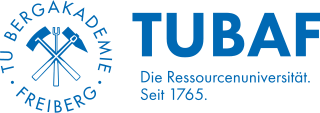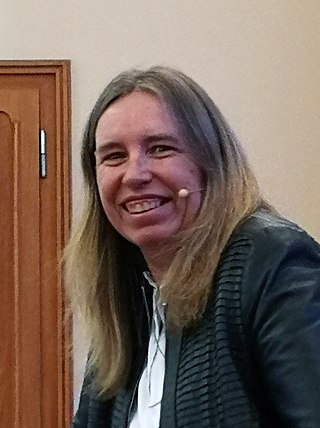
Barbara van Schewick (born 1972 [1] ) is a computer scientist and law professor at Stanford Law School. She is widely recognized as a leading expert on net neutrality and the economic and social implications of internet regulation. [2]

Barbara van Schewick (born 1972 [1] ) is a computer scientist and law professor at Stanford Law School. She is widely recognized as a leading expert on net neutrality and the economic and social implications of internet regulation. [2]
Van Schewick was born in Bonn, North Rhine-Westphalia. [1] She studied computer science at Technische Universität Berlin and law at the Free University of Berlin. [3] After her first state law examination, she initially worked as a lawyer in Berlin, working, among other things, at a management consultancy and as a speechwriter for the then-Governing Mayor Eberhard Diepgen. [1] After her second state law examination, she was the first residential fellow at Lawrence Lessig's newly founded Center for Internet and Society (CIS) at Stanford University for 15 months. [3] Since October 2004, van Schewick has been a research associate at the Department of Telecommunications Networks at Technische Universität Berlin. [1]
In van Schewick's dissertation for the degree of Dr.-Ing., [1] she dealt with Internet architecture, with both the design principles underlying it (particularly the end-to-end principle), and the technical, economic and social progress that this makes possible. [3] Van Schewick's scholarly interests focus particularly on issues of net neutrality. She emphasizes the economic disadvantages to be feared if net neutrality were abandoned and network operators were each able to set their own rules for Internet use. [4] In this respect, she has also been repeatedly consulted as an expert by the Federal Communications Commission. [3] She is of the opinion that the Internet as it was originally designed and has functioned to date, as well as the opportunities for innovation associated with it, are now "in danger." [5] [6] Van Schewick's work was supervised by Bernd Lutterbeck (TU Berlin) and Lawrence Lessig. [1]
In 2007, van Schewick received an appointment at Stanford Law School. [3] She has since also served as associate professor of Electrical Engineering (by courtesy). Since Lessig's move to Harvard Law School, van Schewick has directed the Center for Internet and Society at Stanford.
Van Schewick has received several awards for her work. She was a study and doctoral scholar of the Studienstiftung and a foreign scholar of the Daimler and Benz Foundation. In 2010, she received the Forschungspreis Technische Kommunikation of the Alcatel-Lucent Foundation for Communication Research. [3] For her dissertation Internet Architecture and Innovation, she was awarded the Science Prize of the German Foundation for Law and Informatics (DSRI) in 2005 and the Dieter Meurer Promotion Prize for Legal Informatics of the Deutscher EDV-Gerichtstag in 2006. [7]
Van Schewick is married and has two sons. [8] She is the daughter of the former Federal Administrative Court judge Hans-Jürgen van Schewick.

Lester Lawrence Lessig III is an American legal scholar and political activist. He is the Roy L. Furman Professor of Law at Harvard Law School and the former director of the Edmond J. Safra Center for Ethics at Harvard University. He is the founder of Creative Commons and of Equal Citizens. Lessig was a candidate for the Democratic Party's nomination for president of the United States in the 2016 U.S. presidential election but withdrew before the primaries.

Technische Universität Berlin is a public research university located in Berlin, Germany. It was the first German university to adopt the name "Technische Universität".

The Technische Universität Darmstadt, commonly known as TU Darmstadt, is a research university in the city of Darmstadt, Germany. It was founded in 1877 and received the right to award doctorates in 1899. In 1882, it was the first university in the world to set up a chair in electrical engineering. In 1883, the university founded the first faculty of electrical engineering and introduced the world's first degree course in electrical engineering. In 2004, it became the first German university to be declared as an autonomous university. TU Darmstadt has assumed a pioneering role in Germany. Computer science, electrical engineering, artificial intelligence, mechatronics, business informatics, political science and many more courses were introduced as scientific disciplines in Germany by Darmstadt faculty.

The Technische Universität Bergakademie Freiberg is a public university of technology with 3,471 students in the city of Freiberg, Saxony, Germany. The university's focuses are exploration, mining & extraction, processing, and recycling of natural resources & scrap, as well as developing new materials and researching renewable energies. It is highly specialized and proficient in these fields.
The Center for Internet and Society (CIS) is a public interest technology law and policy program founded in 2000 by Lawrence Lessig at Stanford Law School and a part of Law, Science and Technology Program at Stanford Law School. CIS brings together scholars, academics, legislators, students, programmers, security researchers, and scientists to study the interaction of new technologies and the law and to examine how the synergy between the two can either promote or harm public goods like free speech, innovation, privacy, public commons, diversity, and scientific inquiry. CIS strives to improve both technology and law, encouraging decision makers to design both as a means to further democratic values.

Bernhard Hans Henry Scharoun was a German architect best known for designing the Berliner Philharmonie and the Schminke House in Löbau, Saxony. He was an important exponent of organic and expressionist architecture.

The Gottfried Wilhelm Leibniz Prize, or Leibniz Prize, is awarded by the German Research Foundation to "exceptional scientists and academics for their outstanding achievements in the field of research". Since 1986, up to ten prizes have been awarded annually to individuals or research groups working at a research institution in Germany or at a German research institution abroad. It is considered the most important research award in Germany.

The Berlin-Brandenburg capital region is one of the most prolific centers of higher education and research in the world. It is the largest concentration of universities and colleges in Germany. The city has four public research universities and 27 private, professional and technical colleges (Hochschulen), offering a wide range of disciplines. Access to the German university system is tuition free.

Wolfgang Benz is a German historian and anti-semitism researcher from Ellwangen. He was the director of the Center for Research on Antisemitism of the Technische Universität Berlin between 1990 and 2011, and is also a member of the advisory board for the Memorial to the Murdered Jews of Europe and was involved in the memorial's design. He has written or published over 200 works. He is considered to be one of the most renowned and well-known historians in modern Germany, and one of the foremost scholars on anti-semitism studies. He has been referred to as the "doyen" of anti-semitism research.

Anja Feldmann is a German computer scientist.

Joachim Milberg is a German engineer and manager who served as CEO of Bayerischen Motorenwerke AG (BMW). He was Chairman of the Supervisory Board of BMW until July 2015.

WikiWoods is a group of volunteers who plant trees with the joint aims of preventing climate change and inspiring people to be environmentally aware. Founded in 2007, around 3,400 volunteers have planted 163,100 trees to October 2016. The group is based around a wiki, which enables people to register their own tree planting events, to find like-minded friends in their region, and to network with foresters and other tree experts. As of 2016, events have taken place in Berlin, Brandenburg, Göttingen, and Mecklenburg-Vorpommern in Germany as well as in Hîrbovăț in Moldova. It is hoped that the idea will spread, with further volunteers getting involved in organising tree planting events using the WikiWoods software as a coordinating platform.
T-Labs, formerly known as "Telekom Innovation Laboratories", is the R&D unit of Deutsche Telekom. T-Labs current research areas are: Future Networks, Spatial Computing and Decentralized Systems.
The Axel-Springer-Preis is an annually awarded prize. The Award is given to young journalists in the categories print, TV, radio, and online journalism due to the decisions of the Axel-Springer-Akademie.
Vereinigung für Ökologische Ökonomie (VÖÖ) is a German scientific society promoting ecological principles in the global economy.

José Luis Moreira da Encarnação is a Portuguese computer scientist, Professor Emeritus at the Department of Computer Science of the Technische Universität Darmstadt in Germany and a senior technology and innovation advisor to governments, multinational companies, research institutions and organizations, and foundations. He is involved in the development of research agendas and innovation strategies for socio-economic development with a focus on emerging economies. He is also a member of the Topical Network Information and Communication Technology (ICT) and ICT-related activities of the German National Academy of Science and Engineering (acatech) and the German Berlin-Brandenburg Academy of Sciences and Humanities (BBAW). He is an elected member of the ACM SIGGRAPH Academy (USA).

Herta Hammersbacher (2 December 1900 in Nuremberg – 25 May 1985 in Niederpöcking near Starnberg) was a German landscape architect who taught for more than 20 years at the TU Berlin.
Clara von Simson was a habilitated natural scientist, German politician (FDP) and a member of the Berlin House of Representatives.

Volker Staab is a German architect.
Monika Schwarz-Friesel is a German cognitive scientist, professor at Technische Universität Berlin and one of Europe's most distinguished antisemitism researchers according to Marc Neugröschel from the newspaper The Times of Israel. She is often interviewed by media outlets like Haaretz, Der Standard or Der Tagesspiegel on her research on current forms of antisemitism, which often take place on the internet.
Die frischgebackene Preisträgerin der Alcatel-Lucent-Stiftung und FCC-Gutachterin Barbara van Schewick verwies auf Verstöße gegen Netzneutralitätsregeln auf Grund wirtschaftlicher und politischer Strategien in Märkten wie den USA oder Kanada hin. Sie sagte am Rande der Preisverleihung in Stuttgart, es sei fünf vor zwölf für die Bewahrung des klassischen Internetprinzips und damit der Innovationskraft, die es ermögliche.